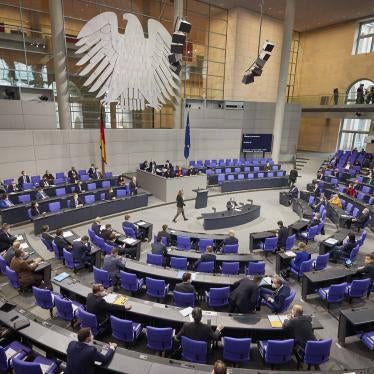Mr Valentinas Stundys,Chairman of the Committee on Education, Science and Culture of the Seimas
Office Fax : Lithuania 2396459
Email: Valentinas.Stundys@lrs.lt
Email of Committee: sviemkkt@lrs.lt
Vilnius
Lithuania
Mr Stundys,
On behalf of Human Rights Watch, I urge you as Chairman of the Standing Committee on Education, Science and Culture to exercise your influence to ensure the plenary assembly of the Seimas will pass a version of the ‘Law on the Protection of Minors against the Detrimental Effect of Public Information' that is fully consistent with Lithuania's obligations under European and international human rights law.
This means ensuring the elimination of any language that could be used to restrict the rights (including the freedom of expression) of any group, or language that encourages discrimination, including discrimination on the grounds of sexual orientation or gender identity.
Last week the Seimas voted in favor of an amendment put forward by Seimas member Gintaras Songaila. This amendment would add a new clause 14 to article 4, part 3 of the Law on the Protection of Minors against the Detrimental Effect of Public Information. The newly approved text forbids public information "that encourages homosexual and bisexual relations as well as polygamy." This text is blatantly discriminatory.
Your committee stands at the head of five committees that have reviewed the Presidential Committee's suggestions for revising the law and rendering it compatible with international human rights standards and Lithuania's international obligations. In the near future the Seimas will be voting on the entire text of the law, including amendments approved after the Standing Committee on Education, Science and Culture submitted its advice to the plenary of the Seimas.
In 1995 Lithuania ratified the European Convention for the Protection of Human Rights and Fundamental Freedoms. In its Article 14, the Convention also prohibits discrimination in the enjoyment of the rights and freedoms set forth in the Convention. The European Court of Human Rights, which authoritatively interprets and enforces the Convention, has recognized, for example in the 2003 case of Karner v. Austria, that sexual orientation is covered by article 14 of the European Convention on Human Rights (as has also been acknowledged in the explanatory memorandum of Protocol No.12) .
In the 2007 case of Baczkowski and others v. Poland- the European Court, referring to the importance of pluralism in a democratic society, stressed the State's positive obligation to secure the effective enjoyment of freedoms of assembly and association. In finding against Polish authorities' efforts to ban lesbian, gay, bisexual, and transgender (LGBT) people's peaceful demonstrations, the Court observed that "this obligation is of particular importance for persons holding unpopular views or belonging to minorities, because they are more vulnerable to victimization" (para.64).
These obligations bind Lithuania to respect, protect, and promote the freedom of expression for all people, regardless of their sexual orientation or gender identity. This new amendment would violate the right to equality by creating an unacceptable environment of state-promoted discrimination against lesbian, gay, bisexual, and transgender people, including youth.
The new amendment also violates the freedom of expression, protected by international treaties to which Lithuania is a party. It would endanger the rights of human rights defenders to promote rights protections and to engage in free discussion about rights principles. It would threaten the health and well-being and arguably the lives of Lithuanian youth by restricting their access to information necessary for them to make critical decisions about their lives, and by censoring accurate information about HIV and AIDS.
The amended text of the law also contradicts Lithuania's public commitments undertaken in signing a joint statement on human rights and sexual orientation and gender identity, presented by 66 States at the General Assembly of the United Nations on December 18, 2008.
Inter alia, the statement reads:
"10. We call upon all States and relevant international human rights mechanisms to commit to promote and protect the human rights of all persons, regardless of sexual orientation or gender identity.
13. We urge States to ensure adequate protection of human rights defenders, and remove obstacles which prevent them from carrying out their work on issues of human rights and sexual orientation and gender identity."
Moreover, the new amendment to the law is in contradiction to the Charter of Fundamental Rights of the European Union, which affirms human rights among the core values of Union, and which came into legal effect with the entry into force of the Treaty of Lisbon on December 1, 2009--one day before the Seimas adopted this amendment. Article 11 of the Charter guarantees the freedom of expression and information. It explicitly stipulates that this freedom includes freedom to hold opinions and to receive and impart information and ideas without interference by public authority. Article 21 of the Charter prohibits discrimination, including specifically on the basis of sexual orientation. The Charter now has status at the "same legal value" as the basic EU treaties and therefore applies in full in Lithuania.
If the Seimas would approve the law including the above mentioned amendment in the final vote, Lithuania would become a state implementing such discriminatory and stigmatizing legislation despite being a member of the European Union. Youth will not have access to information they need to protect their health and to make informed choices about their sexual relationships. Human rights defenders working on sensitive issues related to sexual orientation and gender identity will be prevented from publicly addressing these topics.
I urge you to protect the human rights of all persons in Lithuania, including those of minors, and uphold the right to freedom of expression, including the right to seek, receive and impart information without discrimination on the ground of sexual orientation or gender identity. I urge you to use your influence as chairman of the Committee on Education, Science and Culture and to persuade the majority of the Seimas members to vote against the law including this amendment.
Yours sincerely,
Boris Dittrich
Advocacy Director
Lesbian, Gay, Bisexual and Transgender Rights Program
Human Rights Watch








